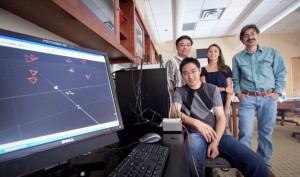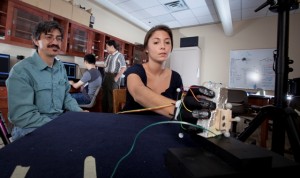
From left, Professor Yih-Choung Yu, Zhao Xin Yin ’13, Camille Borland ’13, and Professor Luis Schettino
Zhao Xin Yin ’13 (Shijiazhuang, China) has a futuristic vision for the research he is conducting on a computerized, wearable glove that studies human grasping behavior.
“With the gloves, we can acquire 10 channels of commands through each finger contact, and if we combine this with touch-screen technologies — which hardly allow multi-point contact — it may be possible to create the futuristic control interface that we see in movies like Minority Report,” says the electrical and computer engineering major.
Although an application such as this could be years away, the project is seeing a good deal of success, as Yin presented the research at the IEEE Conference on Industrial Electronics and Applications June 21-23 in Beijing, China. Yin is working as an EXCEL Scholar on the interdisciplinary project headed by Luis Schettino, assistant professor of psychology, and Yih-Choung Yu, associate professor of electrical and computer engineering. This summer, neuroscience major Camille Borland ’13 (Verona, N.J.) will be continuing the project as an EXCEL Scholar with Schettino.
Yin has developed a system that will register the exact time of finger-object contact at a high resolution. It involves an existing camera capturing system to give a full set of data, including the movement of each finger and their respective contact timing. He also ran the software simulation, built the integrated system, and wrote a simple command file for users to run on MATLAB.
“So far this glove is being used in Professor Schettino’s lab for his research,” says Yin. “However, overall, this is a simple and low-cost device that can be easily replicated for researchers who study prehension in general.”

Professor Luis Schettino and Camille Borland ’13 demonstrate the wearable glove.
Yin explains that the concept of data acquisition through finger-object contacts can be used on a wide range of applications including keyboards, video game controllers, touch-screen devices, and even prosthetics.
The prevalence of electronic products is what drove Yin to explore electrical and computer engineering. “This major offers me endless opportunities to become part of the next big thing in our lives,” he says.
After graduating from Lafayette, Yin hopes to get his graduate degree in the field and create or work for a start-up company.
“This research experience allowed me to look into the many design aspects that we have to keep in mind when delivering a product to a customer. There is so much more to care for beyond penning down a design on paper. It was definitely a fulfilling experience.”

